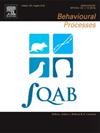Housing-dependent variation in goal-tracking behavior predicts use of a spatial strategy in a dual-solution Morris water maze task
IF 1.3
4区 生物学
Q4 BEHAVIORAL SCIENCES
引用次数: 0
Abstract
Pavlovian Lever Autoshaping (PLA) is a common method for assessing individual differences in addiction vulnerability, while the Morris water maze (MWM) dual solution task may hold promise as a complimentary behavioral assay. In this procedure, brief lever insertion predicts delivery of a food pellet, non-contingent upon behavior. Sign-trackers preferentially interact with the lever, while goal-trackers preferentially interact with the foodcup. To enhance motivation, rats commonly undergo mild food restriction requiring isolation housing—stressful living conditions for a social species. The present work examines the contribution of housing conditions to performance in PLA and a MWM dual solution task. Male and female rats are assigned to one of three housing conditions at weaning: Enriched (four rats per large cage with enrichment objects), Single (singly-housed standard cage with no enrichment), and Raised Enriched (raised under Enriched conditions, but transitioned to Single conditions at eight weeks). Housing conditions influence PLA performance in a sex-dependent manner. Overall, enriched rats engage in more goal-directed behavior while Single and Raised Enriched rats engage in more cue-directed behavior; this pattern is driven by male rats. Additionally, goal-trackers favor a flexible “place” strategy in the MWM. Results suggest that measures of individual differences in goal- vs. cue-directed behavior are highly sensitive to housing conditions; this sensitivity is greater in males.
目标跟踪行为的住房依赖变异预测了双解莫里斯水迷宫任务中空间策略的使用
巴甫洛夫杠杆自动成形(PLA)是评估成瘾脆弱性个体差异的常用方法,而莫里斯水迷宫(MWM)双解任务可能有望作为一种互补的行为分析。在这个过程中,短暂的杠杆插入预测食物颗粒的交付,而不取决于行为。签名跟踪器优先与杠杆交互,而目标跟踪器优先与食物杯交互。为了增强动力,大鼠通常会接受轻微的食物限制,这需要隔离的住房——对于一个群居物种来说,这是一种压力很大的生活条件。本研究考察了住房条件对PLA和MWM双解任务绩效的贡献。雄性和雌性大鼠在断奶时被分配到三种饲养条件中的一种:强化饲养(每个大笼子有浓缩物),单人饲养(单个标准笼子,没有浓缩)和强化饲养(在强化条件下饲养,但在八周后过渡到单人饲养条件)。住房条件以性别依赖的方式影响PLA性能。总体而言,富集的大鼠表现出更多的目标导向行为,而单一和提高富集的大鼠表现出更多的线索导向行为;这种模式是由雄性老鼠驱动的。此外,目标跟踪器在MWM中支持灵活的“位置”策略。结果表明,目标导向行为与线索导向行为的个体差异测量对住房条件高度敏感;这种敏感性在男性中更为明显。
本文章由计算机程序翻译,如有差异,请以英文原文为准。
求助全文
约1分钟内获得全文
求助全文
来源期刊

Behavioural Processes
生物-动物学
CiteScore
2.70
自引率
7.70%
发文量
144
审稿时长
4-8 weeks
期刊介绍:
Behavioural Processes is dedicated to the publication of high-quality original research on animal behaviour from any theoretical perspective. It welcomes contributions that consider animal behaviour from behavioural analytic, cognitive, ethological, ecological and evolutionary points of view. This list is not intended to be exhaustive, and papers that integrate theory and methodology across disciplines are particularly welcome.
 求助内容:
求助内容: 应助结果提醒方式:
应助结果提醒方式:


